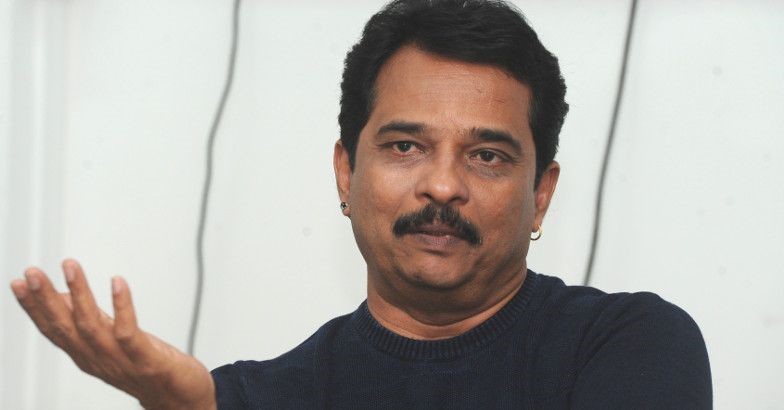by Khalid Ali, film and media correspondent
Medical Humanities will focus on ‘Global Humanities’ as a theme for 2019. Film can be a powerful medium for raising awareness about current global challenges as well as revisiting historical tragedies that befell humanity, as in the first and second World Wars.
It gives me great pleasure to introduce the great Malayalam film-maker and humanitarian, Jayaraj. As a film director and script writer since 1990, Jayaraj embodies the agenda of ‘films for humanity’. In his award winning film ‘Bhayanakam’ 2017, Jayaraj pays tribute to the millions of soldiers and civilians who were killed in WW2, and the 650 soldiers who died in Kuttanad, Kerala in India.

Each of his films is beautifully made as a cinematic poem and a tribute to those who suffer worldwide; in the closing credits of his Berlin Film Festival and FIPRESCI award winner ‘Ottaal’ (2015) he alerts an international audience to alarming statistics from UNICEF: “An estimated 150 million children are engaged in child labour worldwide”. He dedicates the film to “the children and childhood they missed”.
In his short documentary film ‘The Rebirth’, he champions children with special needs to participate fully in family, social and cultural life. As a believer in the rights of children and adolescents to fulfill their potential and secure their dreams, Jayaraj established ‘The Jayaraj Foundation’ in 2010 (http://jayarajfoundation.org/). The Foundation has an ambitious program delivered by the ‘World Organization of Hope’ (WOH). Two pioneering projects, ‘SMART’ (Sports, Music, Art and Recreation Therapy (Yoga and Meditation) and ‘Birds Club International’ engage with children who experienced traumatic experiences, and offer them several creative projects complemented with counselling sessions and visits to older people’s care homes as means of inter-generational dialogue.
“The Moonshine Lies Shattered”
“Ottaal” (India, 2015); directed by Jayaraj, screenplay by Joshy Mangalath.
Review by Professor Robert Abrams, Professor of Old Age Psychiatry, Weill Cornell Medicine, New York
“Ottaal” (“The Trap” in the Malayalam dialect spoken in the Indian state of Kerala) presents a view of childhood that is both idyllic and overshadowed by unstoppable tragedy. In the film’s opening scenes, Kuttappayi, an 8-year-old boy, is writing a desperate letter to his grandfather to rescue him, having awakened in the pre-dawn darkness of Christmas morning to find that he is now working in a fireworks factory. We learn later that, in despair over insurmountable debt, his parents have poisoned themselves; they poisoned Kuttappayi, too, but he is unharmed, at least physically.
Kuttappayi, whose name in the Malayalam language translates to “Gift of God,” is a bright, intellectually curious, and natively compassionate boy. We observe him as he follows his grandfather in his semi-nomadic occupation of herding wild ducks and collecting their eggs. Kuttappayi is both learning the trade and simultaneously discovering nature. This is a child with a remarkable openness, kindness and an appreciation of natural beauty. He is particularly gifted with an ability to forge friendships, whether with a laggard duckling; a stray dog whose very namelessness Kuttappayi dignifies to the status of a name; an ever-hopeful old man who fishes constantly but never catches anything; or with Tinku, a privileged local boy. Kuttappayi, with his keen intelligence and artistic bent, wants nothing more than to resume his studies, to join Tinku’s class and to learn, but because of caste or money or both, his grandfather cannot manage to send him to school.
Ottaal—Official Youtube Trailer
Meanwhile, as Kuttappayi’s relationship with his grandfather deepens, his future is clouded. The grandfather, old and visibly failing, his days numbered, now frets anxiously about Kuttappayi’s fate as an orphan. Unable to place him in school, he reluctantly accepts the inevitable and arranges to send Kuttappayi to the big city to work.
The devastating letter about his terrible new life in the factory that Kuttappayi sends back to his grandfather is where “Ottaal” connects with the Anton Chekhov short story, “Vanka,” from which this film is adapted. The plight of exploited orphaned children in India may be no worse than that of their counterparts in 19th-century Russia, but the appalling cruelty they must endure and the shameful waste of human potential become even more palpable in this film than in the original story. The film shows the sadness of not only the child, but others as well; the lives of Kuttappayi’s grandfather, his friend Tinku, and Tinku’s mother have all been affected by remorse for Kuttappayi’s fate. “Ottaal” is more than an outcry against a social wrong; here the wreckage is personal.
As the film progresses, the viewer comes to recognize “Ottaal” as the beautiful but heartbreaking visual poem it is. The cinematography emphasizes the rich facial expressions of the characters, and these become a kind of backdrop, more telling than words, against which emotions are portrayed. In this way we discern Kuttappayi’s quick responsiveness, his grandfather’s stoic resolve, and the frustrated kindheartedness of Tinku’s mother. Even so, the ‘big picture’ is not neglected here. Kuttappayi and his grandfather gaze at the stars early in the film, trying to understand the mysteries of life; and there are several superb wide-lens views of the landscape that feature Earth’s convex roundness. But in the end, from any angle, there is no escaping the bitter truth as it is hauntingly sung: “The moonshine lies shattered.”
To order a copy of the film, please email jayarajfilms@yahoo.com.